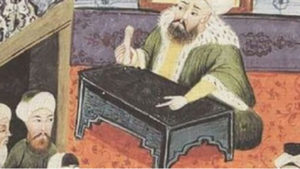Who is a Qazi? A Qazi or Qadi was a judge appointed by the Sultan, ruling under the Islamic law, Shariah. The Qadi’s primary duty was to enforce the Shariah that transcended all other authority across the empire. All laws and practiced adhered to the shariah and were uniformly applied by the Qadi throughout the empire.
The Qadi adjudicated based on his reading of the laws and the Shariah, where the locals abide and accepted these rulings. The Qadi’s position exercised more power than a judge. The qualification of the qazi is very strict.
He constituted the link between the central government and the people. That is where the jurisdiction of the qazi courts was explained so to control the authority of the qazi.
History of Qazi
The term “qadi” was in use right from the time of the Prophet Muhammad (PBUH) and remained the term used for judges throughout Islamic history and the period of the caliphates.
While the muftis and fuqaha played the role in the elucidation of the principles of jurisprudence and the laws, the qadi remained the key person ensuring the establishment of justice based on these very laws and rules.
Thus, the qadi was chosen from among those who had mastered the sciences of jurisprudence and law. The rulers appointed qadis in every region, town, and village for judicial and administrative control and to establish peace and justice over the dominions they controlled.
The Qadi office first originated under the Abbasid Period of the 10th Century, when the Islamic Empire was strong and used centralized power to enforce Shariah norms of equality. During the period of the Abbasid Caliphate, the office of the qadi al-qudat (Chief Justice of the Highest Court) was established.
Among the most famous of the early qadi al-qudat was Qadi Abu Yusuf who was a disciple of the famous early jurist Abu Hanifa. The power of the Qadi became more effective as the Ottoman Empire gradually decentralized.
During the sixteenth and eighteenth centuries, the Ottoman Empire began to decentralize with the power of the Sultan falling short of totality. The Sultan himself became a top figure who was lost control throughout his state, especially in the provinces.
In the 19th century, the Qadi court became a permanent council. The Jurisdiction of the Qazi Courts extended to both civil and criminal matters. Originally, the Qazi’s work was restricted to arbitrating disputes and rendering judgments in matters brought before him.
After their consolidation of administration, they were able to adjudicate religious cases, pious bequests, marriage, divorce, and guardianship of orphans, imbeciles, and others incapable of overseeing their interests.
Classification of Qazi Courts:
There are three categories of institutions through which the siyasha or shariah of the Islamic state is implemented,
- Mazalim courts
- Court of the Qazi
- Court of the Muhtasib
Mazalim courts
This is the highest category of courts. They deal with appellate matters as well as with those that are beyond the jurisdiction of the Qazi.
All rights of the state are adjudicated by these courts and these courts are not bound by the strict requirements of procedure and qualifications of witnesses etc.
Qazi Court
The qazi deals with Hudud, Qisas and Tazir cases where the requirements provided in the Shariah about witnesses and procedures are strictly followed. The qazi also deals with civil matters like contracts, torts and also personal law. He deals with the rights of Allah as well as Tazir.
Muhtasib Court
The Muhtasib courts are responsible for the enforcement of the general morality and the policies of the state under the Islamic norms.
Powers and jurisdiction of the Qazi courts
Power to appoint deputy qazi Following is the quasi-judicial duties of a qazi.
Quasi-judicial-duties of a Qazi
- A qazi may appoint a deputy qazi if he is empowered to do so by the Sultan, and he can also dismiss him.
- He must look after and protect the waqf property.
- The Qazi is the custodian of the property and person of the minors, Lunatics, idiots and missing persons.
- He has the power to appoint an administrator of the deceased.
- Must appoint an ideal person for his assistance. Jurisdiction is called “Wilayat ul Qazi” in Arabic and Muslim states when qazi was appointed than usually jurisdiction is granted through appointment letter. This process is called “taqlid al qazi”. Every qadi had a full divine and imperial authority to enforce the Shariah within his province. qadis in the office were defined and determined by the sacred traditions of Islam. Now, this jurisdiction is of two types;
Jurisdiction of the Qazi Courts
- Ordinary jurisdiction of the Qazi Courts
- Special jurisdiction of the Qazi courts
Ordinary jurisdiction of the Qazi Courts
In this type qazi usually have jurisdiction on all matters and it can of the following type:
- When any right is accrued on any person, and he denies that right than qazi has the power to restore it to the person who has claimed.
- Qazi has the power to place any minor or insane person under interdiction, and he can also appoint any guardian for their properties so that their property can be protected
- He can resolve all disputes between parties through compromise or an order
- Can supervised the awqaf and collect revenue out of these properties and spend it between the required persons
- He can execute will remain in the certain condition and these conditions must be for a lawful reason and if these are unlawful he can terminate the will of the maker of will already appointed any person than he will execute the will otherwise qazi will do it and declare those people as owner in whose favor this will was written
- If proposals of marriage are coming to a widow and if she does not have any wali than he can marry such women. But Imam Abu Hanifa denies this power and says that the widow has the right to conclude marriage contract on its own.
- He can enforce hudud on the guilty person when proved guilty on the request of the plaintiff
- Can also grant an injunction when any unlawful act is done and it is causing trouble for public like unlawfully building some structure etc. he has administrative power in this type of matters\
- He can examine the witness presented in a case and he can conduct tazkiyat ul shadood so that the witness testimony does not have any defect.
- Can supervise his subordinates and the honest staff members must be promoted and dishonest and corrupt staff can be terminated from their posts.
- He should not decide disputes on the basis that certain party have more power mean financially etc. and he should not settle the case according to his whims
Directions to Appoint Qazi
During the reign of Umer Bin Khattab (R.A) when he appointed Abu Musa Al Sheri (r.a) a qazi he wrote him some direction these are as follows:
- To be appointed as a qazi is a very important duty and it is also a sunnah
- Decide the matters based on intellect and justice
- Pay attention to equality that no person feel any kind of deprivation through your decision
- Resolve the disputes between two Muslims subject
- Qazi should not make any haram thing as halal
- It is necessary to look at your previous decision
- If you do not find any help from the Quran or Sunnah than do what your intellect says
- Once the plaintiff says that the defendant is not present, or he does not have any witness than give him some time
- And if he has witnessed than give them an opportunity and then decide the case accordingly
- Every Muslim can be a witness of another Muslim unless he is guilty of false accusation
- Do not confuse or worries and give the right to the entitled person
- A qazi do not have the power to levy any kind of tax
- Neither he can collect sadqat because it is a right of state and there are separate persons appointed for this purpose. Opinion: There is some scholar who says that qazi can also have these powers but the majority say these powers are excluded from his domain.
Special jurisdiction
In the appointment letter, the qazi may be given with some special power or jurisdiction, it may be of the following type;
- He may be given with the jurisdiction on some specific area of land or
- He may have jurisdiction on a certain person or a class of a person
In this situation, he has limited authority, and he can only exercise these powers on that area or persons. Ho has no authority on those persons who are just passing through that area or those people who are staying temporarily.
His area may be restricted to some house or mosque, and he only has power in that area. If someone wants to settle his case he has to come to these places.
Abu Abdullah Zuberi (R.A) states that in Basra (a city of Iraq) these type of qazis are appointed who have limited jurisdiction, and they are called “Qazi Al-Masjid”, usually these qazis are appointed by the richest people who gave them a salary of two hundred Durhams or twenty dinars.
Appointment of more than one qazi in the same area
There are three situations in which more than two qazis are appointed;
- There may be qazi who is appointed on separate areas or land. Then he will only adjudicate those matters which come in that area. This is a preferable situation according to some scholar
- The second situation is that one qazi have jurisdiction on marriages matter and others have jurisdiction on matters relating to properties
- The third situation is that more than two qazis are appointed at the same time. Then they have jurisdiction on all matters. But on this point, there are some opinions from different schools of thought. One sect says it is not preferable because the plaintiff and the defendant will have a dispute on this issue. On party will say that he wants to initiate a case before another qazi and the opposite party will contradict. Other sect says it is allowed and if there is any dispute arises among parties than the opinion of the plaintiff will have a preference. If they have different opinions as to initiating a case then they can go to the nearest court.
Conclusion
From the above discussion, we can say that qazi is a very important person. He was appointed by the sultan. He dispenses justice according to what he reads or through Quran and Sunnah.
The concept of qazi developed gradually through a different period. During the abbasi dynasty and Ottoman Empire, these qazis became more powerful. Then different types of courts and appellate forums were established which have different powers and functions.
The jurisdiction of a qazi court is written in their appointment letter. They cannot go beyond these powers which were given to them by the ruler.
They have ordinary jurisdiction and it will include all matters or specific jurisdiction with limited power on some specific subjects. There is a difference of opinion on appointing more than one qazi in the same area
Reference
Adab ul Qazi by Mehmood Ahmad Qazi



